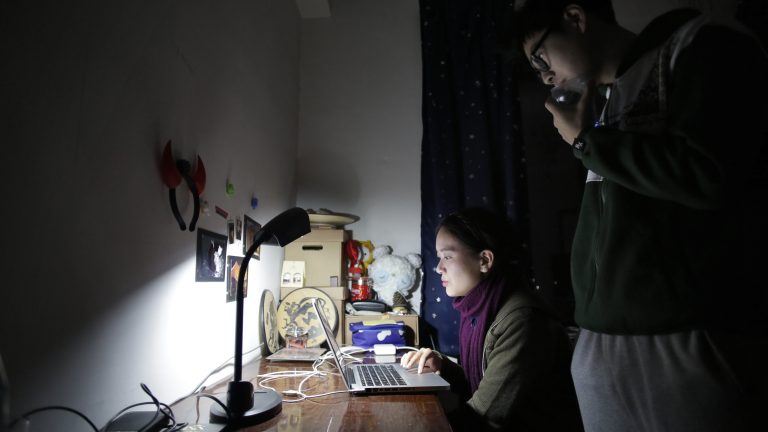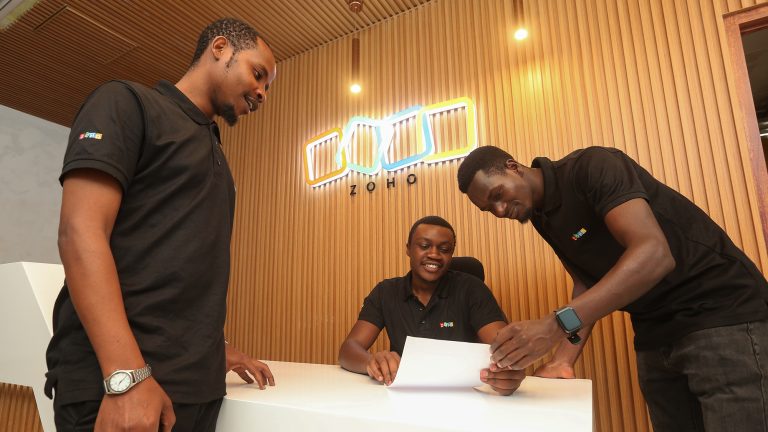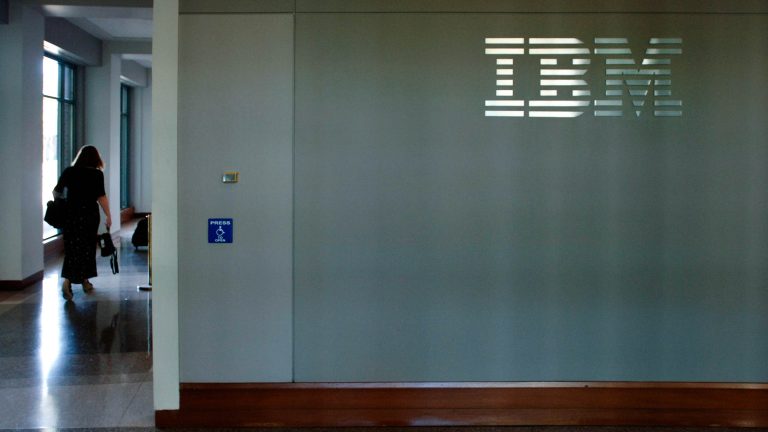Watching through a camera, a proctor monitors a Chinese student taking an English exam. Sitting in a Beijing living room, the student appears to be taking the test seriously. They frown during the listening session, as if trying hard to think about the answer. And for the written portion, their arms move about, with the tapping of a keyboard being heard.
But the student wasn’t typing anything. They weren’t even looking at the screen. Sitting next to the student, just outside of the camera’s field of view, was 34-year-old Tony Wang. As he’d done for dozens of students before, Wang was answering the questions by typing on a wireless keyboard, sometimes while eating barbecued skewers. For the speaking portion, he’d type the answers on an iPad or a smartphone for students to read out. And students who couldn’t speak English at all would silently move their lips while Wang invisibly spoke aloud the answer on their behalf.
Wang, who runs an agency that helps Chinese students study abroad, told Rest of World he had helped more than 100 students cheat on the Test of English as a Foreign Language (Toefl) exam since at-home tests became available in 2020. “To insiders like us, ETS online testing is just a joke,” Wang said. (ETS, or Educational Testing Service, is the New Jersey-based company that administers Toefl and the GRE graduate school entry exam.)
Hundreds of thousands of students from China head overseas to study every year. Many are able to pass admission tests or hand in applications on their own, while others have resorted to professional help. Wang is just one of many people in an industry that coaches prospective students on everything from studying for English-language tests to writing their personal statements for them. It not only offers cram courses that help students improve and achieve better scores but also ways to game the system. In the past, students have been found to access test materials in advance or have imposters take the exams for them with fake passports. The SAT college admission tests in China have been canceled in the past after questions were leaked.
The introduction of at-home testing for Toefl, GRE, the GMAT management admission exam, and even the LSAT law school aptitude tests during the pandemic has made it easier to cheat, fueling the practice in China. For a few thousand U.S. dollars, professionals like Wang make sure students obtain test scores high enough to land them places at the world’s top universities. Over the past three months, Rest of World spoke to more than a dozen people offering cheating services, and their student clients. Our investigation found that these test-prep professionals have taken exams for students not only from across China but also overseas, by sitting next to them or remotely controlling their computers. To pass spoken tests, some imposters, dubbed “teachers,” even appear on camera dressed up as their student clients.
The lucrative business has grown into what some test-prep professionals say is a multimillion-dollar industry specializing in baofen, meaning “guaranteed scores” in Chinese. On social media, those who post about studying for Toefl or GRE tests are bombarded with direct messages from self-proclaimed test-prep centers seeking new clients. More than 10 thousand people may have cheated on international tests during the pandemic, two managers from cheating businesses told Rest of World. For some Toefl sessions, they could even obtain test materials, dubbed jijing in Chinese, in advance, the cheating professionals say.
Wang said some of his clients had studied hard and could have scored 90 out of 120 by themselves in a Toefl exam, but still resorted to cheating to pump up their scores to above 100. Some others, he said, could not understand English at all. Some were brought in by their parents, while others asked him to keep the dishonesty from their families. Some students have been admitted to the top 30 universities in the U.S., Wang said. His clientele also includes company executives and pop stars.
In response to a Rest of World inquiry in December, ETS’ chief security officer, Wallace Dalrymple, said the company is aware of cheating attempts around the world, and is spending tens of millions of dollars each year to detect and prevent cheating. In June, the company admitted that at-home assessments have contributed to an increase in cheating globally. Test-takers have attempted to cheat using remote-access software, proxy testing, or cellphones to send and receive messages. “To prevent the potential for proxy test takers, we have a comprehensive security check, identification review and test environment scan prior to the start of a test administration,” Dalrymple said, adding that test materials are stored securely. “We know that they exist and we are catching them.”
Despite the best efforts of test agencies, Chinese companies are still offering a variety of methods that cater to people at different locations with different levels of English proficiency. The services are sometimes more affordable than legitimate test-prep courses.
“Foreigners are not that sensitive towards the facial features of Chinese people.”
Another test-prep company owner in China, who spoke on condition of anonymity due to privacy concerns, told Rest of World about one popular service the company provides that answers questions for students using remote-access software. For 12,000 yuan ($1,678), it makes sure clients receive a total of at least 85 points out of 90 — from reading, listening, and writing sessions. For the spoken test, the company provides a script, but students are responsible for reading it out. The owner told Rest of World that his team has helped about 100 to 200 clients cheat on Toefl or GRE tests every month.
This company has more expensive options too: Having someone sit for an entire remote Toefl or GRE exam costs about $4,000. Clients first send over their photos, and the company searches for look-alikes among its professional test-takers. They put on makeup and sit for the test, bearing the identities of their clients. (“The proctors are usually foreigners,” Wang said. “Foreigners are not that sensitive towards the facial features of Chinese people.”) The owner said this service, dubbed quanti or “entirely substituted,” was popular among affluent Chinese students who were enrolled in American high schools or colleges. They would be applying to undergraduate or postgraduate programs, but would be unable to obtain the scores they needed. “I’m helping them,” he said.
A university student in the central Chinese province of Henan told Rest of World in November that she recently hired a company to help her with the Toefl test by sending answers to her phone during an at-home exam. The company initially asked for 18,000 yuan ($2,548), but she bargained it down to 15,000 ($2,124). The student said she felt bad for cheating, but she was eager to obtain a high score before the application deadlines for the fall 2023 master’s programs in the U.S. “I think everyone struggles [with ethics],” she said. “It’s not a good thing after all.”
Helping others cheat on state exams is a criminal offense in China. But test-prep professionals say Chinese authorities have little interest in how they exploit the security lapses of international tests. On social platforms including WeChat, Xiaohongshu, and Douban, test-prep agencies openly advertise cheating services for other online-proctored exams such as GMAT, the PTE Academic exam, IELTS Indicator, and the Duolingo English Test. One company contacted by Rest of World offered cheating services for the LSAT, a rigorous exam required by most law schools in the U.S., charging 40,000 yuan ($5,662) to obtain a score of 160 out of 180, and 60,000 yuan ($8,494) to hit 170, good enough for a Harvard Law School applicant.
Testing authorities say they have imposed stringent security measures to combat cheating. A Duolingo spokesperson told Rest of World the company has an “extremely secure” testing system, powered by human proctors and artificial intelligence, and the existence of cheating operations did not mean fraudulent scores were getting certified. Pearson, owner of PTE Academic Online, says its AI and human-run review process detects fraud and revokes scores when malpractice is confirmed. The Graduate Management Admission Council, which runs the GMAT test, told Rest of World it is aware of cheating services being advertised, and it’s using the “most current technology” to deter inappropriate behaviors. The Law School Admission Council, which administers LSAT, also says it’s committed to ensuring integrity and fairness for test-takers. A spokesperson at the British Council, which runs IELTS, says a small percentage of test-takers who resort to cheating either fall victim to scammers, or have their scores canceled upon detection.
Dishonest acts do get detected. ETS, for example, cancels test-takers’ scores when it suspects cheating. The company said it recorded a 200% increase in Toefl and GRE score cancellations in the second year of at-home testing during the 2021 financial year, compared to 2020. Wang, the test-taking agent in Beijing, said that as he worked on the exams, young students sometimes misbehaved while sitting idle in front of the camera for hours — he had to remind them to look back at where the screen was supposed to be. Recently, he said, he deliberately gave some wrong answers on reading and listening tests when he sat in for students. “Americans are not idiots, either,” he said. “If the scores are too high, they wouldn’t believe it.”
Since it’s difficult for remote proctors to catch someone cheating on the spot, Wang said, the worst penalty the ETS might inflict is to ban someone from taking the tests for one year. The owner of the other test-prep center said that even if clients get their scores canceled after their first cheating attempt, most of them would succeed the second time around. His clients have never been caught with remote-control software. “10,000% undetectable,” he said. “As long as the students are not too stupid.”
Wang said he has had his own ethical struggles, but to free himself from the moral burden, he tells himself students would cheat anyway without his participation, and that those who could not access his service would be at a disadvantage compared to their cheating peers. “Everyone is doing that,” Wang said. “At least if someone comes to me, I make sure they get the service I have promised.”



